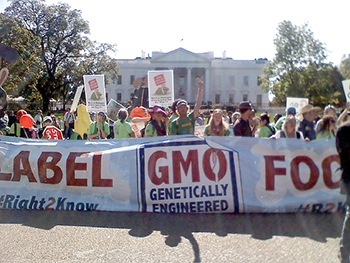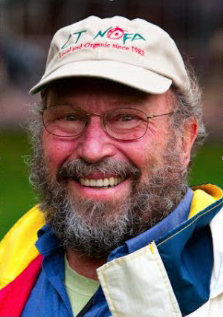Class News
Bill Duesing '64 on the labeling of GMO foods
Most Americans want GMO foods labeled; big agribusiness doesn’t
An opinion piece by Bill Duesing published in CT Viewpoints

August 19, 2015
The passage of the Safe and Affordable Food Act by the U.S. House of Representatives is yet another example of how the vast amounts of money spent by special interest groups undermines our democracy.
This Act, also known as HB 1599, or the DARK Act (Denying Americans the Right to Know) would not only overturn Connecticut's pioneering law that requires labeling of foods containing genetically modified ingredients (and similar laws in Maine and Vermont), it would permanently prevent people from knowing if foods contain genetically modified organisms and allow foods containing GMOs to be labeled as "natural."
We are grateful to our five Connecticut representatives who voted against this Orwellian legislation.
If our democracy really worked, these novel ingredients would have been labeled years ago, as they are now in 64 other countries, including 19 of the 20 most educated countries, 16 of the 20 wealthiest countries, and 18 of the 20 most scientific ones. Scotland just totally banned the growing of these crops.
For nearly two decades, poll after poll has shown that the vast majority of Americans — well over 80 percent — think these GMO foods should be labeled. This NY Times poll from two years ago found that 93 percent favored labeling.
GMOs could be the best thing since sliced bread or the most dangerous change ever in our food and agricultural system. It really doesn't matter for labeling. In a democracy, if a majority wants something that is within the government's power, it should happen, especially after nearly two decades.
However, the voices of citizens are drowned out by the vast sums spent by the biotech and big food and agriculture corporations and organizations.
According to the Environmental Working Group, groups opposed to mandatory GMO labeling spent over $50 million so far this year and nearly $150 million in the last three years just to lobby Congress.
According to Maplight, pro-biotech interests have made nearly $25 million in political contributions to the campaigns of House members, over three-and-a-half times what the labeling proponents have donated. That amounts to nearly $100,000 in contributions for each yes vote for the DARK Act. For years, supporters of GMOs have also spent enormous sums of money to fight state labeling initiatives (over $100 million in just four states) and on public relations and marketing. Yet sales of organic and non-GMO food are soaring.
In a ruling supporting Vermont's GMO labeling law, U.S. District Judge Christina Reiss wrote that “The safety of food products, the protection of the environment, and the accommodation of religious beliefs and practices are all quintessential governmental interests, as is the State’s desire ‘to promote informed consumer decision-making.’ ”
Despite what the well-oiled and wealthy biotech propaganda machine says, the issues raised by the judge are all very relevant. Earlier this year, the European Network of Scientists for Social and Environmental Responsibility issued a statement signed by more than 300 MDs, PhDs, and DVMs which claims that, at this time, there is no scientific consensus on the health and environmental safety of GMOs.
The widespread use of Roundup as an integral part of GMO technology has already destroyed biodiversity on millions of acres of farmland and created many super weeds. This failing technology will be continued for perhaps another decade or so by the addition of 2,4-D to the Roundup already sprayed on much of our food: 2,4-D is a chemical warfare agent from the Vietnam era.

Environmental and human health are just two of the reasons so many people want GMOs labeled. Organic farmers are concerned about GMO pollen contaminating their crops; people are concerned about the detrimental effects of concentrated control of our food and agriculture system.
Who's going to control our future — wealthy corporations or people? That's the essential question when our democracy is at stake.
Bill Duesing is the founder of the Northeast Organic Farming Association of Connecticut and operator of Old Solar Farm in Oxford.

